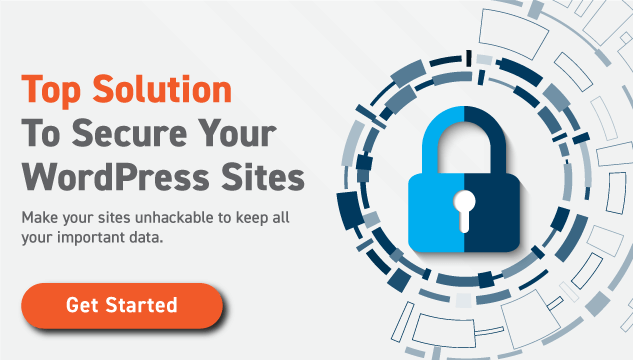The world of WordPress security seems to be a revolving door of new threats and new cybersecurity tools to fight those threats.
The good news is that we aren’t being completely steamrolled in the fight to keep our websites safe. As cybercriminals become more sophisticated, so do our defences against them. From static sites to better passwords, here are seven of our best WordPress security predictions for 2021!
7 WordPress security predictions for 2021
1. Migration to Static Sites
In 2021, you can expect webmasters who are concerned about WordPress security to migrate their WordPress website to a static site. A static site is also called a newspaper site or a brochure site, because it’s created using fixed code, which means that it’s delivered to users’ browsers exactly as it’s stored on the server. The content on a static website is fixed. It always looks the same, no matter when you retrieve it. If you want to change the content of a static webpage, you have to manually adjust the code.
Static websites are more secure than dynamic websites, because, for one thing, static websites don’t use a database like dynamic websites do. This means that there’s no database for hackers to attack.
This also means that you won’t need to worry about Cross-Site Scripting (XSS) attacks, in which hackers inject malicious JavaScript into your webpages. This can then run to your users’ browsers, so that hackers can change the content on your webpage or steal information. The code in a static website can’t be adjusted by injection, because it’s completely fixed.
You also don’t need to worry about SQL database injections, because, with a static website, there is no database. That’s why, in 2021, we can expect to see mass migrations of WordPress websites to static websites. In anticipation of this trend, we’ve curated packages especially for agencies and developers who want the security of a static website!
2. Headless CMS
WordPress is one of the most popular Content Management Systems in the world. As part of a general WordPress security strategy in 2021, we can expect to see a lot of WordPress users go headless.
Here’s What Headless CMS Means:
With a traditional CMS, a website’s front end and back end are inextricably linked. Headless CMS decouples the front end from the back end. This frees you up significantly. For instance, with traditional WordPress, you can only code in PHP or JavaScript. With the headless CMS, you can code in whatever programming language makes you feel most comfortable.
Not only that, but headless CMS reduces the attack area for hackers to get into your system, especially if you store your front end and back end on different servers. No wonder it’ll be trending in 2021!
3. SSL Certificates
An SSL certificate encrypts data that passes between your server and your visitors’ browsers. Most websites have already made the switch from HTTP to HTTPS, and in 2021, we can expect that trend to continue.
But didn’t we just mention that most people will be migrating to static websites? How does that square with the increase in SSL certificates? Can’t you forget about SSL certificates when you have a static website?
Short answer: No.
Long answer: Even though a static website is much safer than a dynamic website, that doesn’t mean hackers can’t still get to your source code. It will be a lot more work, and most of them will give up long before they can launch a successful attack, but that doesn’t mean it’s impossible. An SSL certificate is a line of defence against this.
Also, Google gives you a search ranking boost when you have an SSL certificate, and internet users still look for that trusty padlock (or green bar, or checkmark, depending on their browsers) that tell them it’s safe to visit your website.
Because SSL certificates are so important to your security and your search engine ranking, we’ve partnered with Luxhosting to give you a free SSL certificate when you use our platform!
4. Multi-Factor Authentication
Multi-Factor Authentication (MFA) means visitors to a website will need to do more than just enter a username and a password to be granted access. This is especially true for websites that collect sensitive information, like eCommerce sites.
With MFA, in addition to providing a username and password, a visitor will need to provide an additional means of authenticating their identity. This is usually in the form of a code that’s sent to their smartphones. Bigger sites like YouTube are already doing this, but in 2021, you can expect this security trend to wade further into the mainstream.
5. Cybersecurity Insurance
With cyberattacks becoming increasingly expensive, in 2021, you can expect to see an increase in cybersecurity insurance (or “cyber-risk insurance”) as businesses scramble to protect themselves against seemingly inevitable data breaches. In the past, most businesses couldn’t justify the added expense of cybersecurity insurance, but nowadays, the benefits are starting to outweigh the costs.
6. Fewer File Upload Permissions
Even with the strictest security measures, entire cybersecurity strategies can be toppled by the uploading of a single malicious file. As a result, websites are going to be scanning files more carefully, restricting file uploads, or even doing away with them altogether. This will be impractical for websites whose entire model revolves around user uploads, but for websites that can manage it, we can definitely expect to see fewer upload permissions.
7. Better Password Protection
Gone the days of “password123” or “0000”. In 2021, we can expect websites to take password creation a lot more seriously.
If a brand’s cyber defences were breached because of a weak password, the fallout would be nearly irreparable. And stronger passwords don’t only apply to website admins. This goes for users, too. Every user with a weak password and generic username is another possible point of entry for hackers. So, we can expect to see more websites demand that their users create passwords that fit the criteria for safe browsing, namely:
- A mixture of lower- and upper-case letters
- Symbols, such as @, #, and %
- Numbers
- The inclusion of the spacebar as a possible character
The Takeaway
As data breaches become more common, website security is at the forefront of our minds. Luckily, in 2021, we can expect to see webmasters adopt these seven security strategies to prevent our data from falling into the wrong hands.





